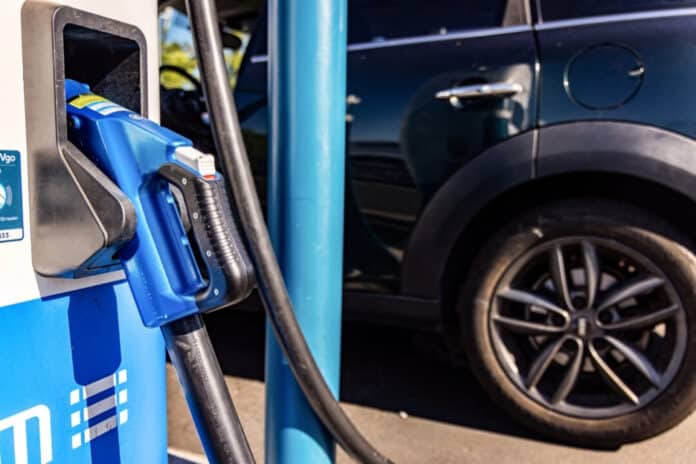
A new study suggests that nearly one in five electric vehicle (EV) chargers are unusable, shedding light on the challenges EV drivers face with charging infrastructure across the United States.
For the study, researchers from Georgia Institute of Technology and Harvard Business School examined more than 1 million charging-station reviews left by EV drivers across North America, Europe, and Asia over the past 10 years.
With the help of artificial intelligence models, the researchers said they were able to identify struggles of EV life beyond “range anxiety”—the common fear that the battery will die before they reach their destination or a charging port—and detail deeper frustrations such as unreliability of chargers, nontransparent pricing, clashes with gas-powered car drivers, and the complete absence of chargers in their area.
The study found that charging stations in the United States were given an overall reliability score of 78 percent, meaning that about one in five chargers don’t work.
This shows that charging stations are, on average, less reliable than traditional gas stations, according to Omar Asensio, the study’s leading author and a Georgia Tech professor specializing in climate and energy policy.
“Imagine if you go to a traditional gas station and two out of 10 times the pumps are out of order,” Mr. Asensio, who is also a research fellow at Harvard Business School, stated in a news release about the study. “Consumers would revolt.”
Pricing emerged as another major source of EV driver grievances. According to the study, the cost of charging an EV at a commercial charger could be very unpredictable as the market is unregulated and providers follow different pricing models.
Unlike traditional gas stations that simply display real-time fuel prices on signs, pricing at EV stations can vary substantially by facility, level of demand, the type of charger available, the extent of the charging session, and other factors.
“For example, some stations had different prices for different plug types or different times of the day,” the study noted. “Some stations had conditional prices based on membership or subscription status. Some stations had no explicit price but required a donation or a purchase at a nearby store. Moreover, some pricing schemes were too complex or ambiguous to be parsed by simple rules.”
As a result, EV drivers often find themselves arriving at a charging station without any information on what to expect or how to compare prices the same way as their gas car-driving peers.
Nowhere to charge
The study further highlighted the phenomenon of “charging deserts,” or places with no charging facilities at all. To the researchers’ surprise, those places actually exist in states with the highest number of registered EVs.
For example, Washington state ranked fourth in EV registrations and sixth in public charging stations in 2023. Yet northeastern Ferry County had just a single charging station for several years, and that one charger no longer exists. In Virginia, which ranks 11th in EV registrations and 13th in public chargers, Wise County had no chargers available.
The researchers also noted a practice known in the EV community as “ICEing,” in which an internal combustion engine (ICE) vehicle parks in a space intended for charging EVs. Drivers have complained on social media about being “ICE’d” over the years.
In an interview with Harvard Business School, Mr. Asensio shared a personal anecdote about trying, and failing, to convince his mother to switch to an EV.
“Her decision wasn’t about the price,” he said. “She said charging isn’t convenient enough yet to justify learning an entirely new way of driving.”
Meanwhile, President Joe Biden has pledged to make at least 500,000 public chargers available across the country by 2030, part of a broader goal that half of all new vehicles sold in the United States will be electric by 2030.
Democrat lawmakers have urged the federal government to speed up the pace of building charging stations. Among them is Sen. Jeff Merkley (D-Ore.), who expressed his dissatisfaction at a June 5 hearing in front of Federal Highway Administrator Shailen Bhatt.
Mr. Bhatt testified that fewer than 100 EV charging points have been made available so far.
“That is pathetic. We’re now three years into this. That is a vast administrative failure,” said Mr. Merkley. “Something is terribly wrong and it needs to be fixed.”
“I share your frustration around the speed of the deployment,” Mr. Bhatt replied, explaining that there are “a number of problems” when it comes to working with states to get the chargers deployed. He said that thousands of chargers are expected to come online by the end of the year.
This article was originally published at The Epoch Times.










